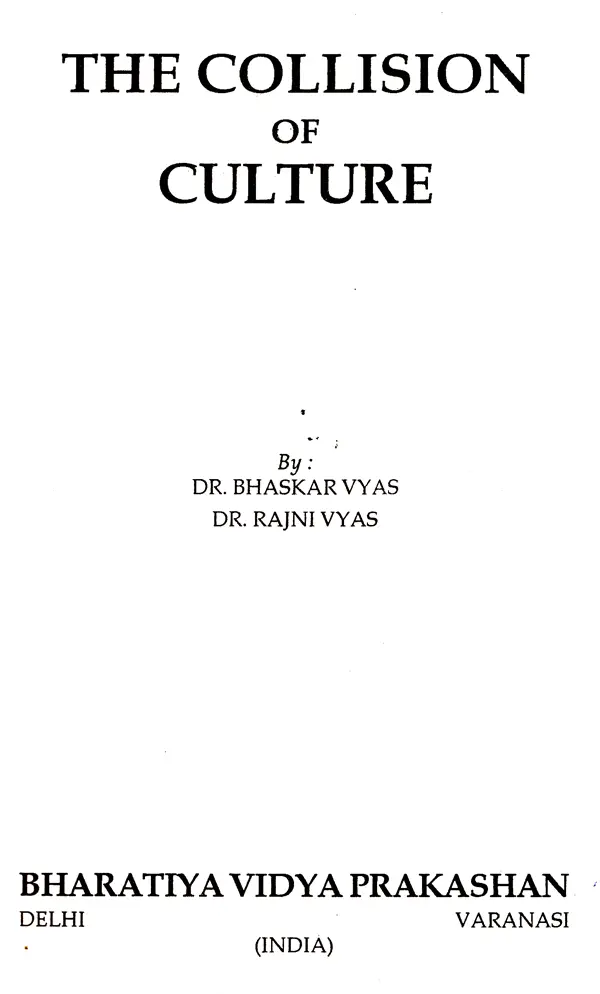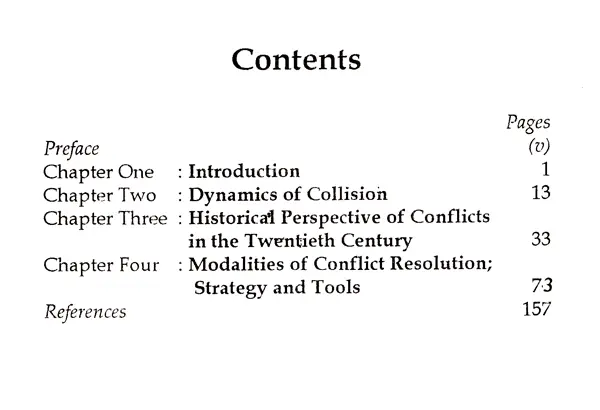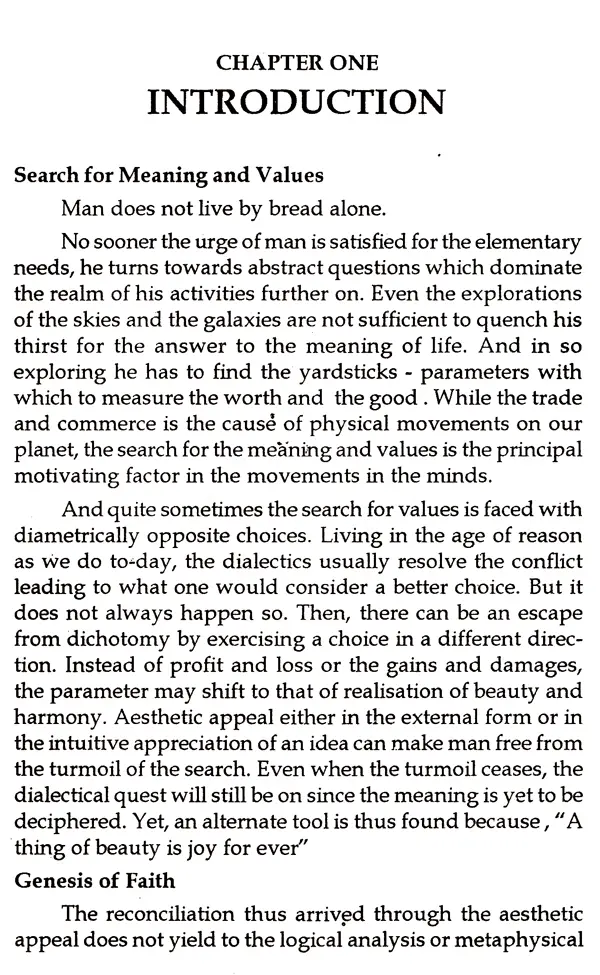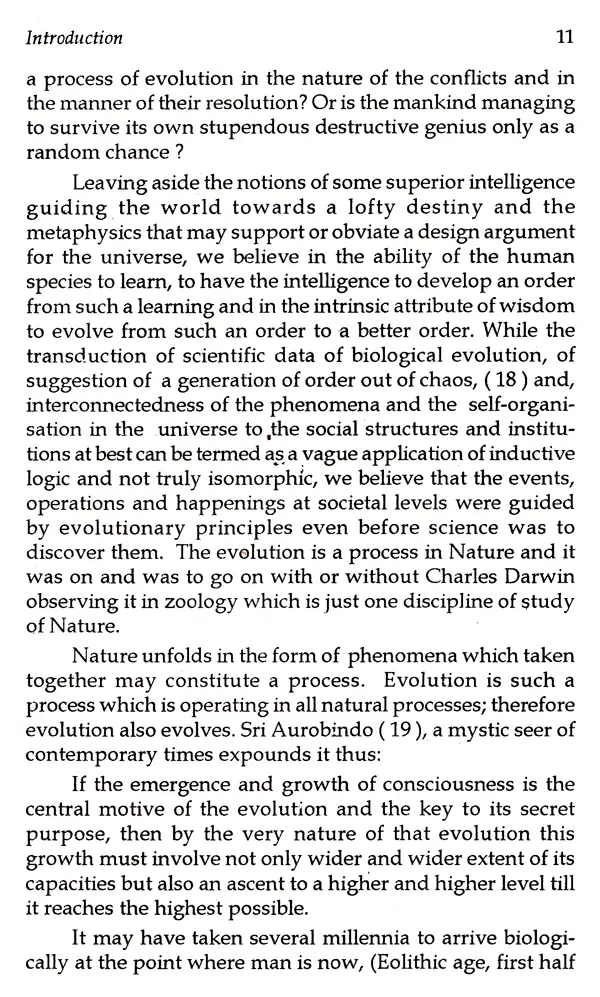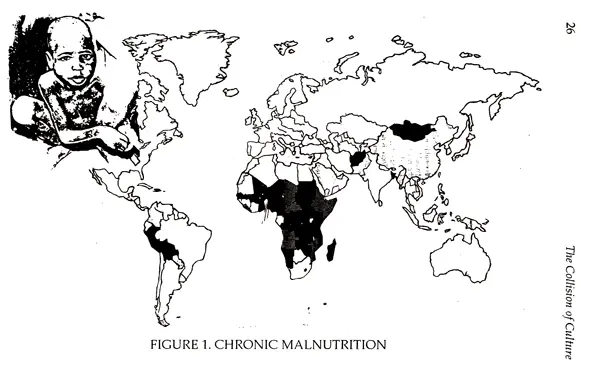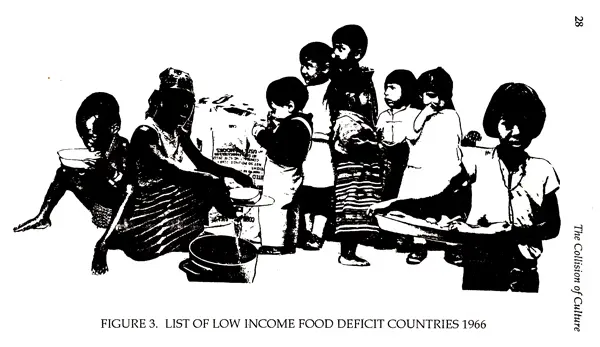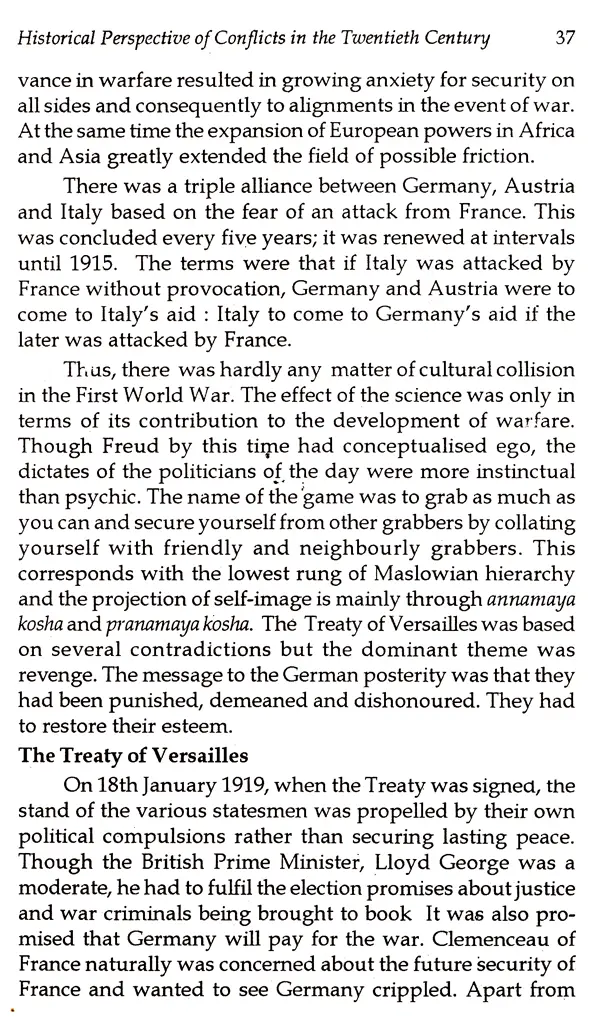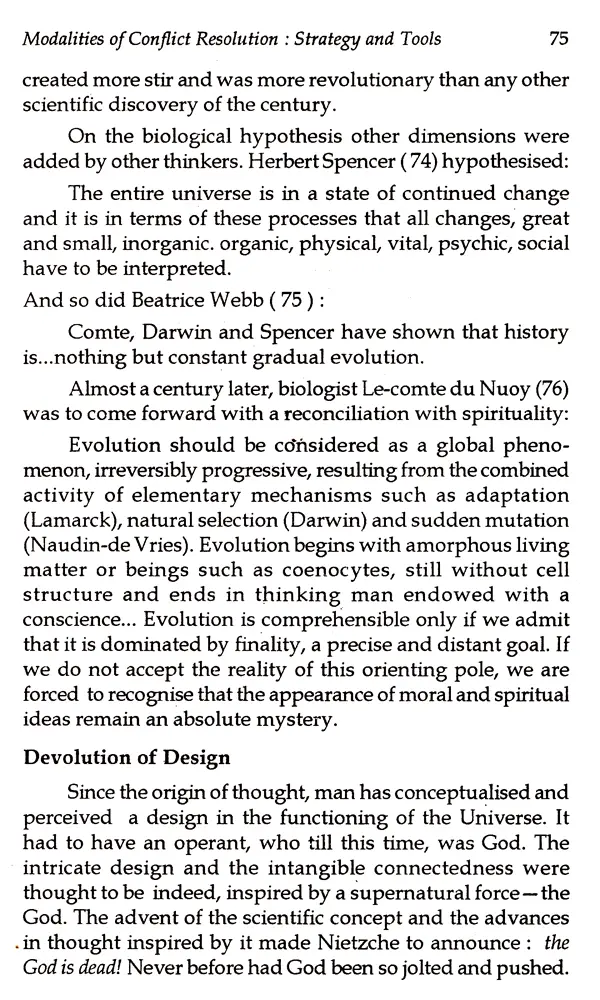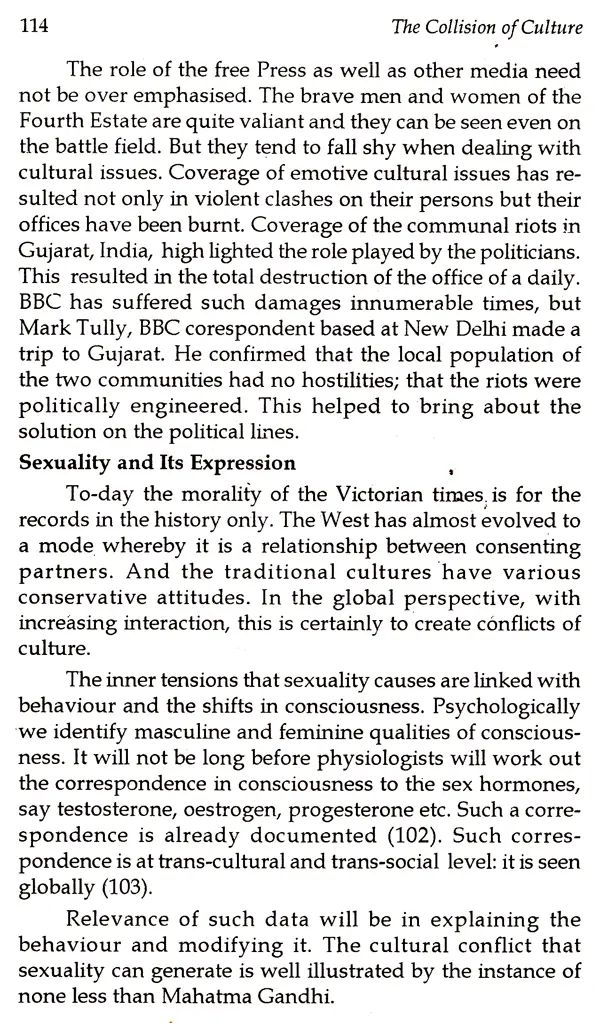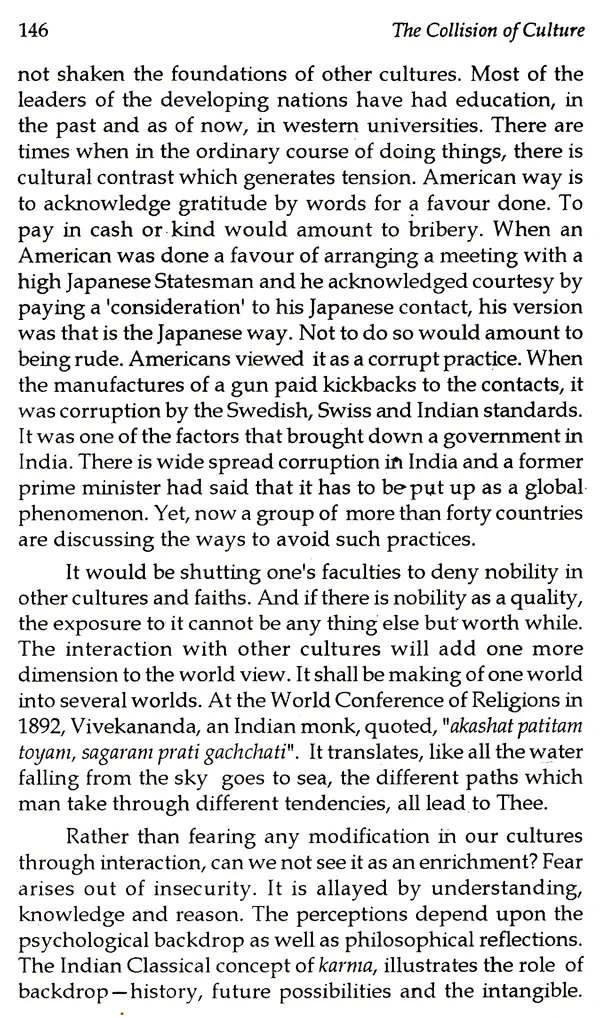
The Collision of Culture
Book Specification
| Item Code: | UAN209 |
| Author: | Dr. Bhaskar Vyas & Dr. Rajni Vyas |
| Publisher: | Bharatiya Vidya Prakshan, Delhi |
| Language: | English |
| Edition: | 2000 |
| ISBN: | 8121701457 |
| Pages: | 176 |
| Cover: | HARDCOVER |
| Other Details | 8.90 X 5.60 inch |
| Weight | 290 gm |
Book Description
Bhaskar Vyas and Rajni Vyas in this psycho-philosophical treatise explore how people world over endeavour to beautify life by evolving finer expression of their culture. They succinctly paraphrase the identity of self with cultural symbols through archetypal images. They examine the instinct of aggression particularly under the population pressures as well as childhood deprivation. Deriving support for their hypothesis from the empirical data from historical perspectives of the conflicts of the century, they identify a teleological evolution of man, parallel with but far more accelerated than, the Darwinian.
In the concluding chapter, they evaluate various software systems that our civilization has evolved for the conflict resolution. Though all religions are full of such a repertoire, they are more often the cause of the collisions than resolution. Politics has come to be the first and last resort of a scoundrel; though there is a hope from the statesmen of distinction. Activists organizations and Fourth estate have only limited roles. Resting on the holistic view, they envisage an Omega point where the participatory anthropic principle seems to be driving the intelligence over the entire universe. A definite programme to keep the individual intelligence, pragyana, and the collective consciousness clear, is elucidated.
Thus, the book will take the reader face to face with the historical forces governing our civilization and its possible evolution to a better future.
In contrast to the earlier times when migration was mainly in the form of labour, now the migration across the globe is that of professionals. This new brand of diaspora is more alive to their culture. With the boundaries between the countries becoming more pervious, the spirit of patriotism and nationalism is giving way to the cultural identity. The shift in the paradigm is to accept the country of living as a political unit that is necessary for governance; while the culture is what is really lived as the form of life. For better career prospects, people to-day are easily giving up their nationality; they adhere to culture for generations to come.
With this backdrop, the purpose of the following presentation is to examine:
As a consequence of technical globalisation and progressive interdependence, is the collision of the Western (American- European, Jewish-Christian) culture and those of Asia the inevitable perspective which must result upon simultaneous rediscovery of culture-specific identities within the scope of the Western and various Asian traditions, religions, philosophies and cultures in the world of the 21st Century? What strategies for avoiding this can be gleaned from the discussions above all between Western and Eastern cultures and philosophical traditions?
What is the outlook on the applicability of this philosophical dialogue to the world of politics and/or its potential power in Western and Eastern nations to enable and promote a peaceful encounter of Eastern and Western cultures as well as a radical instrumentalization of the differences between Eastern and Western traditions and characteristics?
The answers to these questions are sought through two altogether different but, mutually not exclusive, modality of thought. The initial discussions are carried out through logical, didactic, discussive thought. This corresponds to the Western philosophical model and has recently come to be known as the faculty of the left side of the brain. In the concluding chapter four, there is exploration by the alternate modality of intuitive faculty which corresponds to the philosophical approaches of East and Far Eastern traditions of Vedanta, Taoists, Confucian and the Buddhist thought too, which corresponds with the right hemispheric function of the human brain; so as to finally draw conclusions from a holistic approach.
And in the process of exploration, the approach is not confined to a particular discipline. Some writers write across disciplines, continents and centuries because "Nothing in the nature is quite separate as two mounds of exper tise"(1). It is often the case that the teories of a particular discipline cannot be sustained because they donot satisfac torily explain the problems they are dealing with; when they are compounded with isomorphism from the other disciplines, there is, through inductive logic at least, some resolution. One has of course, particularly when following such an approach, to be aware about the warning Bertrand Russell has sounded: A chicken may wake up every morning to be fed; but one morning, it may find its neck wrung rather than the feed.
There is enough evidence in contemporary history to deduce motivation for the conflicts; though evolution of the motives can not be traced as a straight line while interpreting data either through the statements of formal logic or as statements of science as advocated by the logical positivists; doing so will lend one in a situation which Amartya Sen has called "a rational fool". What positivists call as poetical, emotive, pictorial or motivational (and therefore ascribe no sense to it), has a tremendous relevance to life processes and happenings at the societal-political-cultural scene and must be accounted for.
**Contents and Sample Pages**
